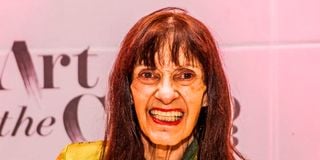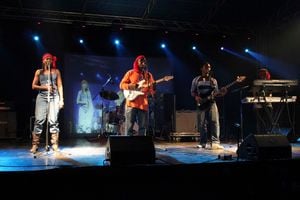
Margaretta wa Gacheru poses for a photo at The Artcaffe Riverside in Nairobi.
When I was first introduced to Margaretta wa Gacheru and the Nation Centre in the mid 1990s,I was shocked. I had come across her byline for many years having started reading newspapers way back in primary school. I had never imagined Wa Gacheru was a white lady.
In my mind, I had built the image of a matronly Kikuyu woman.
Indeed, Margaretta’s name had misled hundreds of thousands of readers who had come across her name for decades. “When I meet one of my readers, the shock and surprise is always evident.
You see, over the years most of them have built this image of some Kikuyu mama because of my name,” she once told me. Margarreta’s passing earlier this week, brought down the curtains on half a century of illustrious career in performed arts journalism and an incredible love affair with Kenya that started the University of Nairobi in the early 1970s.
In the media and arts world, she was visible as the fast paced, slightly built white woman always in mid-stride as she hassled from this assignment to the next.
In the Eastlands part of Nairobi where she lived for many years she was known as Mama Migwi. Migwi was her son. Margarretta’s 50-year-old love affair with Kenya and Kenyans started in 1974 when she first came to the country on a student exchange programme. She arrived as Margaretta Swigert which was her maiden name. When she first arrived, she had her immediate future all mapped out.

Then Youth Affairs, Creative Economy and Sports Cabinet Secretary Ababu Namwamba with arts writer Margaretta wa Gacheru at Talanta Plaza in Nairobi on January 23, 2024.
She would see some bit of Kenya, take time to study for a Master’s degree in African Literature then fly back home to Chicago. By the time she arrived in Kenya, she had already obtained Bachelors and Masters degrees from universities back home.
With her qualifications, she expected smooth enrollment at the University of Nairobi. That was until she encountered the head of the Literature Department in the person of Ngugi wa Thiong’o.
In not so many words the professor told her that her Bachelor’s degree in Sociology and Comparative Religion was as phony as they came. So, take a hike and try your luck elsewhere. Margarreta was never a quitter. She sought the help of Prof Micere Mugo who was also in the department. Prof Wa Thiong’o relented but cleverly demanded that she first undertook an undergraduate Literature course.
While Prof Wa Thiong’o had expected her to decline and fade away, he was in for a shock. Margaretta enrolled for the Bachelor’s programme.
Studying day and night, she finished three year course in just over one year. As she was to recall later, it was her most intensive study time of her life.
After bagging her Bachelor’s she went back to Prof Wa Thiong’o. She was interested in studying Pan African literature. The professor flat footed her one more time. She was to take African-American literature based on the writing of Malcom X.
Margaretta too had a mind of her own.
She brought back a thesis on the house nigger, a comparative pejorative for black slaves. Slaves who worked in the master’s house enjoyed a few perks for their meekness.
Farm slaves on the other hand were more rebellious and disdain for their house slaves. Margaretta never stopped reading. She added two more masters degrees to her resume. In 2011, she earned her PhD, her seventh degree.
During her time, the Literature Department throbbed with life. Besides Wa Thing’o, and Mugo,the faculty was home to such luminaries as John Ruganda Okot’ p’ Bitek and Jonathan Kariara among others. Margaretta was immediately drawn to tempestuous performing arts scene at the university making her debut with the play, The Trial of Dedan Kimathi.
With her on stage were notable thespians such as Kenneth Watene, Stephen Mwenesi and Sibi Okumu. She later joined the university’s travelling theatre.
Besides her studies and theatre, Margaretta found love in a graduate student, Gacheru wa Migwi who she married in 1978. By this time, she had already made up her mind. She wasn’t going back to the America.
Her long career in journalism started as an arts reporter at the defunct Nairobi Times. Unlike other expatriate arts journalists who were mostly interested in European theatre, Margaretta concentrated on African theatre.
Her contribution in bringing African theatre to the national stage is widely acknowledged by both thespians and art lovers. In the following decades and up to the time her health deteriorated over the last few years, she worked the theatre scene. For years, her name was synonymous the arts pages of Nation newspapers.
Her marriage with Gacheru ended in a divorce in 1982. Yet even after they went separate ways, she remained deeply concerned about his welfare. She would also routinely visit his parents in Kirinyaga. Even after Gacheru passed on, Margaretta remained a friend to his family.
Even as her health went south, Margaretta remained the dare devil. In the recent past, her transport of choice was the boda boda. Once, I told her riding on those bikes in Nairobi was extremely dangerous. She dismissed my concern with a hearty, “Kwenda uko!”
Peaceful sojourn in the mists, Margaretta.






